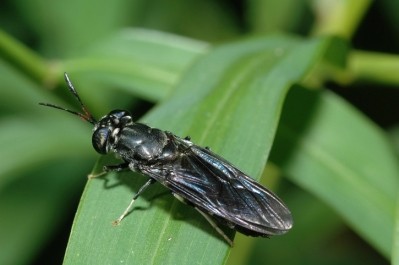CFIA: Increasing interest in insect feed ingredients prompts guidance check

The Canadian Food Inspection Agency (CFIA) is seeking comment on the proposed guidance through August 17. The agency is interested in hearing if the guidance is clear, if more information is needed or if additional criteria regarding ingredient “safety of efficacy” should be added.
The intention of the guidance document is to help clarify the registration requirements regarding new feed ingredients derived from insects, the agency said.
Insect-based feed ingredients may contain 40-45% protein and up to 35% fat, but products also vary by insect species, growth substrate, rearing method and even by the ingredient generated.
In Canada, all feed ingredients must be approved and listed according to feed regulation before they can be used in a mixed feed, said a spokesperson with CFIA.
Insect-based feed ingredient producers need to provide information regarding the safety and use of the ingredient to the agency before ingredients can be reviewed for approval.
The draft guidance now open for comment was not intended to alter how insect-based feed ingredients are regulated, he told FeedNavigator. However, the goal is to simplify or improve the application process.
“This should result in better quality submissions reducing false starts by registrants and possibly leading to the registration of new sources of existing approved ingredients as well the submission and approval of new insect-derived feed ingredients,” he told us.
Additional development and commentary on the regulatory guidance are being explored because of expanding interest in researching and producing insect-derived feed ingredients, the spokesperson said.
“In July 2018, the Government of Canada committed $210,970 in funding under the Canadian Agricultural Adaptation Program (CAAP) to Centre de recherche agroalimentaire de Mirabel (CRAM) to examine several aspects of edible insects for food and feed,” he said. “This funding will contribute to the growing body of knowledge on insect rearing and production for food and feed and will help position Canada as a leader in this fast-growing sector.”
Requirements for registration and renewal were initially established as part of the approval process for the “whole dried black soldier fly larvae,” in 2016 and have been shared with other feed ingredient developers, he said.
“The Animal Feed Division has been providing the draft contents of this proposed regulatory guidance document to applicants seeking to develop new sources of insect-derived feed ingredients on an ad hoc basis since 2016.”
The role of guidance, registration
Overall, the guidance related to the registering of insect-based feed ingredients looks to improve the understanding of what is needed to generate a complete dossier for submission to CFIA, said the spokesperson.
“The regulatory guidance seeks to consolidate the background and the required data requirements to simplify the development of a thorough feed registration and approval package by applicants seeking to produce insect-derived feed ingredients,” he said.
Approved feeds need to be “safe for the livestock for which they are intended, for food safety, and for the environment,” he said. Feeds also need to have a “nutritional purpose” for their use.
“A quality submission addressing all of the requirements indicated in the regulatory guidance should minimize delays and allow scientific evaluators (nutritionists, toxicologists, and microbiologists) to assess the safety and efficacy of any new sources of insect-derived feed ingredients,” he said.
The registration process asks ingredient producers to provide information regarding the safety and use of the insect, the manufacturing process and the feed ingredient generated, CFIA said.
It also requires that physical, biological and chemical hazards be identified.














